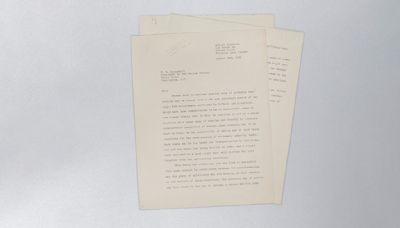Search results
Albert Einstein ( / ˈaɪnstaɪn / EYEN-styne; [4] German: [ˈalbɛɐt ˈʔaɪnʃtaɪn] ⓘ; 14 March 1879 – 18 April 1955) was a German-born theoretical physicist who is widely held to be one of the greatest and most influential scientists of all time. Best known for developing the theory of relativity, Einstein also made important ...
2 days ago · Albert Einstein (born March 14, 1879, Ulm, Württemberg, Germany—died April 18, 1955, Princeton, New Jersey, U.S.) was a German-born physicist who developed the special and general theories of relativity and won the Nobel Prize for Physics in 1921 for his explanation of the photoelectric effect. Einstein is generally considered the most influential physicist of the 20th century.
Oct 27, 2009 · The German-born physicist Albert Einstein developed the first of his groundbreaking theories while working as a clerk in the Swiss patent office in Bern. After making his name with four scientific ...
Albert Einstein was born at Ulm, in Württemberg, Germany, on March 14, 1879. Six weeks later the family moved to Munich, where he later on began his schooling at the Luitpold Gymnasium. Later, they moved to Italy and Albert continued his education at Aarau, Switzerland and in 1896 he entered the Swiss Federal Polytechnic School in Zurich to be ...
Albert Einstein, (born March 14, 1879, Ulm, Württemberg, Ger.—died April 18, 1955, Princeton, N.J., U.S.), German-born Swiss-U.S. scientist. Born to a Jewish family in Germany, he grew up in Munich, and in 1894 he moved to Aarau, Switz. He attended a technical school in Zürich (graduating in 1900) and during this period renounced his German ...
Albert Einstein grew up in Munich, where his father founded an electrical engineering company. After studying at the ETH university in Zurich, Einstein worked at the patent office in Bern, during which time he produced several pioneering works in the field of physics. He was later employed at universities in Bern, Zurich, and Prague, and from 1914, in Berlin. After the Nazis seized power in Germany, Einstein immigrated to the US, where he worked at the Institute for Advanced Study in ...
2 days ago · Albert Einstein - Physics, Relativity, Nobel Prize: After graduation in 1900, Einstein faced one of the greatest crises in his life. Because he studied advanced subjects on his own, he often cut classes; this earned him the animosity of some professors, especially Heinrich Weber. Unfortunately, Einstein asked Weber for a letter of recommendation. Einstein was subsequently turned down for every academic position that he applied to. He later wrote, Meanwhile, Einstein’s relationship with ...
Albert Einstein was a German-born theoretical physicist who is widely held to be one of the greatest and most influential scientists of all time. Best known for developing the theory of relativity, Einstein also made important contributions to quantum mechanics, and was thus a central figure in the revolutionary reshaping of the scientific understanding of nature that modern physics accomplished in the first decades of the twentieth century. His mass–energy equivalence formula E = mc2 ...
Albert Einstein is arguably the most influential scientist of the 20th century. His general theory of relativity changed our understanding of space and time, becoming one of the two pillars of ...
Jan 5, 2016 · Nobel Prize winner Albert Einstein is one of the most influential and well-known physicist in history. Learn more about his life and work in this mini biogra...

